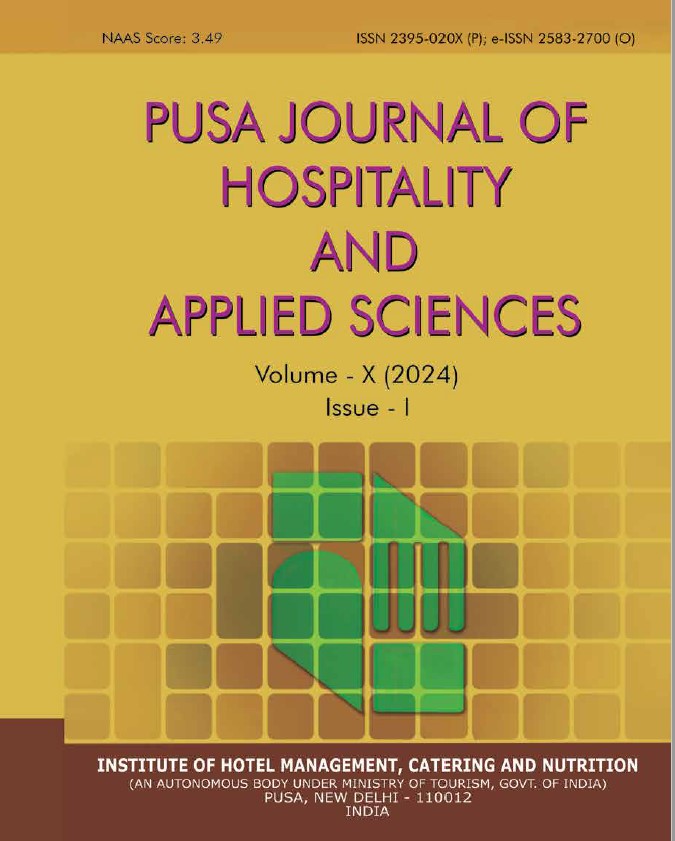SUSTAINABILITY SYSTEM TO BENEFIT BOTH GUEST AND HOTELS
DOI:
https://doi.org/10.48165/pjhas.2024.10.1.1Keywords:
Sustainability, Hospitallity Industry, Hotels, Guests, EnvironmentAbstract
Background: The research paper was to develop a universal sustainability rewards program in an upscale business hotel. With growing concern for depleting natural resources this program aims at rewarding guests for conserving natural resources. Objective: The study was to identify the consumer behavior and perception towards sustainability and to curate a universal sustainable rewards program. This study proposes a conceptual framework that combines the principles of sustainability, customer loyalty, and corporate social responsibility to design a rewards program that promotes environmentally responsible behaviors among hotel guests. Methodology: Quantitative research design was used in which an energy survey of a two hotels was conducted through telephonic interview with the Incharge of the Hotel Engineering Department and a survey among five hundred general consumers was done to assess their attitudes and behaviors towards sustainability through a Google form. The data was analyzed by calculating frequency and percentage. Results: The findings indicated that sustainable practices have become increasingly important to guests (92%) and 98% feel that an encouraging program would be an effective way to promote sustainable behaviors. The study also identified the key features and benefits of a sustainability programs and around 90% of customers prioritize sustainability efforts and innovations when selecting their accommodations, reinforcing the on-going trend observed in consumer behaviour. Around 81.3% of respondents expressed their willingness to partake in a universal sustainability rewards program and provided recommendations for its successful implementation in hotels. The rewards program gives credit points for optimal conservation of resources. It is universal in nature, i.e. these points can be earned as well as utilized anywhere across the globe. Conclusion: The proposed program has the potential to enhance the hotel’s reputation as a socially responsible business, attract environmentally conscious guests, and contribute to the sustainable development of the hospitality industry.
References
Abdelkader, A. (2022). Fusion of sustainability in the tourism industry for improved competitiveness: Investigation of five-star hotels in Kuwait. Administrative Sciences, 12(4), 168. https://doi.org/10.3390/admsci12040168
Al-Zboun, N., & Ibrahim, H. M. H. (2021). Differences in sustainability practices among jordanian hotels. ResearchGate. https://www.researchgate. net/publication/364129041_Differences_in_ Sustainability_Practices_among_Jordanian_Hotels/ link/633bf7d676e39959d69b5c17/download
Efthymiou, L., Morphitis, A., Drousiotis, P., & Orphanidou, Y. (2022). Sustainability initiatives in Cypriot Hotels and the way forward through digital marketing communication. Research Gate. https://
www.researchgate.net/publication/360768635_ Sustainability_initiatives_in_Cypriot_Hotels_and_ the_way_forward_through_Digital_Marketing_ Communication/link/62893fe98ecbaa07fcc89987/ download
Kang, Y., Hsiao, H. S., & Ni, J. (2022). The role of sustainable training and reward in influencing employee accountability perception and behaviour for corporate sustainability. Sustainability, 14(18), 11589. https://doi.
org/10.3390/su141811589
Kassim, M. A. (2023). Environmental Sustainability Practices in Hotels: From Attitudes to Implementation Case of Resort Hotels in Bishoftu, Ethiopia. IntechOpen EBooks. https://doi.org/10.5772/intechopen.109433
mcgill.ca. Accessed on 17.3.2024
Mohanty, P. P. (2020). Green marketing towards hotel sustainability: Insight of India, opportunities and challenges. Researches Reviews of the Department of
Geography, Tourism and Hotel Management. 49–2, 181–194
Nautiyal, R. and Seth, N. (2017). A study on assessment of environmental practices and awareness level of hospitality students generated by TRAS program. PUSA Journal of Hospitality and Applied Sciences.3, 26- 30
Oxenswärdh, A. (2022). Sustainability efforts in practice in European hotels: A tricky business? Quality, Innovation, Prosperity, 26(3), 1–21. https://doi.org/10.12776/qip. v26i3.1773
Prakash, S., Sharma, V., Singh, R., Vijayvargy, L., & Nilaish, N. (2022). Adopting green and sustainable practices in the hotel industry operations- an analysis of critical performance indicators for improved environmental quality. Management of Environmental Quality: An International Journal. https://doi.org/10.1108/meq-03-
-0090
Sarode, A. V. (2022). Start-up hotels and environment sustainability-benefits and strategy. ResearchGate. https:// www.researchgate.net/publication/367089861_Start Up_Hotels_And_Environment_Sustainability-Benefits_ And_Strategy/link/63c0e011eab5ff0149ab5c7f/ download
schoolofsustainability.asu.edu/about/defining-sustainability. Accessed on 17.3.2024
The Elements of Sustainability in Hotels–1413 Words | Research Paper Example. (2022). Free Essays. https:// ivypanda.com/essays/sustainability-in-hotels/
un.org/en/academic-impact/sustainability. Accessed on 17.3.2024
Upadhay, A., Pomponi, F., & Vadam, C. (2016). Sustainability in the hotel industry. Research Gate. https://www.researchgate.net/publication/290168567_ Sustainability_in_the_Hotel_Industry/ link/58ef90070f7e9b6f82dbb588/download
Verma, V., & Chandra, B. (2018). Sustainability and customers’ hotel choice behaviour: a choice-based conjoint analysis approach. Environment, Development and Sustainability, 20(3), 1347–1363. https://doi.
org/10.1007/s10668-017-9944-6




